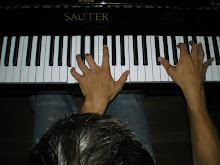I showed some friends of mine the rite of spring recently. They both were unsure how they felt about it. The dissonances were jarring, they complained. I explained why dissonance should not be a problem, but that doesn’t change much.
I've been listening to 60 second clips of Meredith monk's Atlas. While parts seem kinda incongruent- it appears at least, in from what i can read in 60 seconds,as a beautiful work (sometimes extraordinarily so). I wish i could get a better listen, i'd imagine i'd like it quite a bit.
I've always felt (i remember years ago thinking this and complaining to my mom about it) that opera was only good when it was fully abstracted or when it was as close to dramatic theatre as possible- that the stilted half way point between theatre and abstract musicality (thats basically a result of the classical/romantic tradition) was just a marginalization of either the music or the plot (usually the plot/dialogue/development) and was generally ineffective as both elements.
Abstraction, in my mind, was the only solution. I hate hearing these tacky dialogue being sung, as more of a necessity to keep a story moving then as something really prized An opera with the text as poetry could work, as it avoids the banality that can result from a truncated dialogue/plot format, but then again, writing as poetry requires a degree of abstraction
On the other end of the spectrum i now believe that spoken text as the basis in an opera could express any of the nuance of theatre (or even more with the addition/juxtaposition of music) and not cheapen the music. The music could certainly act in some relationship to the text being read, but it would be difficult to do this without sounding trite- Problem: what would make it more than just incidental music for a play?
Final pet peeve in music for theatre/film/opera/whatever is the use of minor chords for sad/angry situations or major harmonies for things perceived as more cheerful. Not only is this practice banal, its useless. What is the point of filling in all the space between listener and the actions on stage? To express a rigid concept of what is happy and sad devoid of the nuance of interpretation? Its the space between the two that allows a listener an ability to perceive the drama in a consciously different and personal manner, not shoving something down someone’s throat as if they were too inattentive or stupid to get it themselves.
Lahti
2 years ago

1 comment:
I haven't heard much of his operatic work but Robert Ashley might satisfy for both spoken text and abstraction.
Robert Gable
http://rgable.typepad.com/aworks
Post a Comment